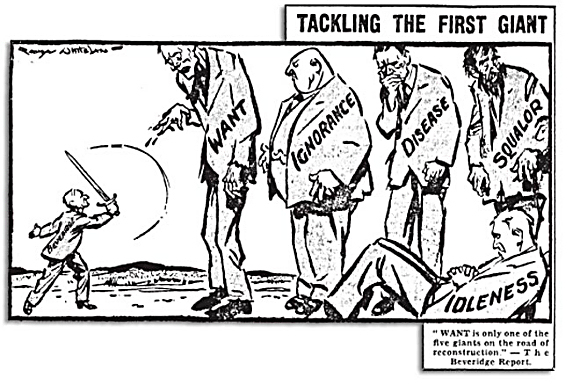Identifiable progress on the other four giants could be shown but could it be said of idleness? On a trip to New York I went to a presentation by the boss of the Upper Manhattan Empowerment Zone (a Clinton initiative). At the start of the speech he talked about his community activism in the 70's and 80's and how they had lost sight of what was important. He argued they focused on improving the welfare system rather than getting people off it. He said they simply didn't get that the best means to better health, social and economic outcomes for an adult human being was to get them into a job.
I was working in the community development sector at the time and could see some of that criticism applying to the approach in the UK. The moral hazard fears associated with a welfare state seemed to becoming true especially after the mass and generational unemployment of the 1980's. Through my work I'd hear the justification for declining a job of "It wouldn't pay me/them". For those who would be worse off I would accept it but too often it was "It's only twenty quid a week more. It wouldn't pay me/them." The logic was to apply the number of hours worked to the extra income rather than the total wage. This logic often meant the only job that would be finanically attractive would be something they simply could not get with their level of qualifications.
The Labour Party did import some of the Clinton initiatives e.g. tax credits and introduced the minimum wage to make work pay. So they did increase the pull but they didn't introduce any push into the system (apart from the 'unofficial' policy of transferring people from unemployment to sickness benefits) that was central to the successes at state level. The failure to reform the benefits system was the greatest domestic policy mistake of the recent Labour government. Such reforms would have been easier introduced in a time of significant economic growth and have reduced the need to important low skill labour from Europe.
The Con Dem Coalition has been talking of bringing forward its options for welfare reform. It uses the more PC description of "culture of worklessness" rather than idleness. However, from comments yesterday it looks like it is focusing on the pull factors and not enough on push:
"So they will benefit, not just by money, they will benefit because they will now understand a system which has become incomprehensible to most of them and full of pitfalls and traps and different hours of work which you have to, really, be some sort of brilliant mathematician to understand."
As outlined above a bit extra is not the logic in operation and securing the upfront costs for these reforms will not be easy either in the present climate.

No comments:
Post a Comment